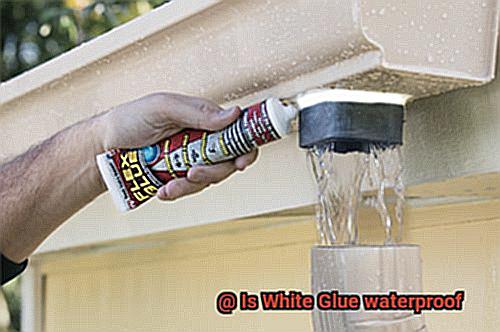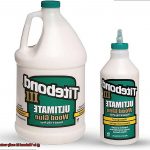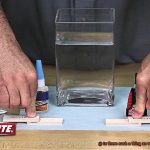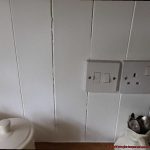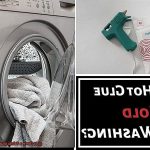Are you a DIY enthusiast who loves getting creative with white glue? Have you ever wondered if it’s waterproof? Whether you’re a seasoned crafter or just starting out, understanding the properties of adhesives is crucial to achieving success in your projects.
White glue, also known as Elmer’s glue, is a popular choice due to its versatility and ease of use. But when it comes to water resistance, can it hold up against moisture?
In this article, we’ll dive into the topic of white glue and its waterproofing capabilities. We’ll take a closer look at its chemical composition and how it reacts to water exposure. Additionally, we’ll explore different types of white glue and how their waterproofing abilities differ.
If you’ve ever experienced the frustration of watching your hard work dissolve in the rain or humidity, then understanding the waterproofing potential of white glue is crucial. So before embarking on your next project, join us as we uncover all there is to know about white glue and its ability to withstand water.
What is White Glue?
Contents
Also known as school glue or PVA glue, this water-based adhesive is versatile, easy-to-use, and creates a strong bond between surfaces.
White glue is made up of synthetic polymers like polyvinyl alcohol and vinyl acetate monomer that are dissolved in water to create the adhesive. While it was first invented in Germany in the 1920s, it didn’t become widely used in the United States until the 1950s. Since then, it has become one of the most popular types of adhesives on the market due to its non-toxic and washable properties.
This adhesive works wonders on porous surfaces like paper, cardboard, fabric, wood, and even some plastics. However, it may not be as effective on smooth or non-porous surfaces. It dries clear and creates a reliable bond between surfaces, making it a favorite among parents and teachers for children’s projects.
One question often asked about white glue is whether it’s waterproof or not. In short, it’s not entirely waterproof. While it can withstand light moisture or humidity exposure, prolonged exposure to water or moisture can cause it to break down.
There are specific types of white glues that are water-resistant or water-repellent. These types of glues are perfect for projects exposed to water or humidity.
Is White Glue Waterproof?
While white glue, also known as PVA glue, is a reliable adhesive, it’s not completely waterproof.
The reason for this lies in the composition of white glue. It’s made from a synthetic polymer called polyvinyl acetate (PVA), which is water-soluble. When exposed to water, the PVA molecules in the glue start to dissolve and break down. This leads to a loss of adhesive properties, making it less effective as a bonding agent.
Some manufacturers have created “water-resistant” or “waterproof” versions of white glue by adding additional additives to make them more resistant to water. However, even with these specialized versions of white glue, there are still limitations to their effectiveness.
Factors like temperature and humidity can also impact the durability of white glue. If you need a stronger bond and greater resistance to water for your project, it’s best to use specialized adhesives designed for those specific purposes.
Pros and Cons of Using White Glue
White glue is a favorite among many due to its versatility and non-toxic nature, but it’s important to weigh the pros and cons before using it.
On the plus side, white glue is incredibly versatile and can be used on paper, cardboard, fabric, wood, and more. Plus, it’s non-toxic, making it safe for even the youngest crafters. Once dried, white glue becomes transparent, making it ideal for projects where the glue should not be visible. And cleanup is a breeze since it can easily be cleaned up with water while still wet.
However, there are also some drawbacks to using white glue. One major disadvantage is that it’s not waterproof, meaning it will lose its adhesive properties if exposed to moisture or water.
Another downside is its long drying time compared to other adhesives like super glue or hot glue. This means you’ll need to exercise patience before moving on to the next step of your project.
On paper or thin materials, white glue can cause wrinkling due to its moisture content. Lastly, if not used correctly, white glue can be messy and difficult to clean up once it has dried.
Types of Water-Resistant White Glue
This type of adhesive is a must-have for any crafting enthusiast or woodworker who wants to tackle outdoor projects or items that will come in contact with water. But with so many options available in the market, which one should you choose? Let’s take a closer look at the types of water-resistant white glue available.
Polyvinyl acetate (PVA) glue is a popular choice that can provide strong bonding for porous materials such as wood and paper. It dries clear and can be sanded or painted over once it has dried. Although PVA glue is water-resistant to some extent, it may not be the best option for long-term exposure to water or moisture.
Epoxy glue is another type of water-resistant white glue that creates a strong and durable bond that can withstand exposure to water, heat, and chemicals. It’s perfect for marine applications, such as boat-building or repairing fiberglass hulls. However, epoxy can be challenging to work with as it requires precise mixing ratios and has a relatively short working time before it sets.
If you need an instant bonding solution, cyanoacrylate (CA) glue may be the best option for you. Also known as superglue or instant glue, CA glue can bond a variety of materials quickly and effectively. While it is water-resistant to some extent, it’s not recommended for applications that require long-term exposure to water or moisture.
How to Choose the Right Type of Glue for Your Project
Glue is a powerful tool that can bring your DIY projects to life. But with so many types of glue available, it can be difficult to know which one to choose. Here are some tips to help you pick the right glue for your project and ensure that your creation stands the test of time.
Consider the Materials You’ll Be Bonding Together
Choosing the right glue starts with understanding the materials you’ll be bonding together. Certain glues are better suited for specific materials than others. For example, if you’re bonding wood to metal, epoxy or polyurethane glue might be a better choice than standard white glue. Make sure to select a glue that is compatible with both surfaces for the strongest bond possible.
Determine the Strength of the Bond You Need
The strength of your bond is another crucial factor to consider when selecting glue. Some adhesives are designed for temporary bonds, while others form permanent bonds that can withstand heavy use and wear. If your project will be exposed to moisture or extreme temperatures, you’ll need a glue that is waterproof or heat-resistant.
Know the Limitations of White Glue
White glue, also known as PVA glue, is a popular choice for many projects because it dries clear and can be easily cleaned up with water while still wet. However, it’s important to note that white glue is not inherently waterproof and may not be suitable for every application.
Look for Waterproof Options
If your project will be exposed to water or moisture, it’s essential to choose a waterproof glue such as epoxy or polyurethane adhesive. These glues form strong, durable bonds that can withstand exposure to water and moisture and can be used on a variety of surfaces.
Consider Cyanoacrylate (Super Glue) for Fast-Drying Projects
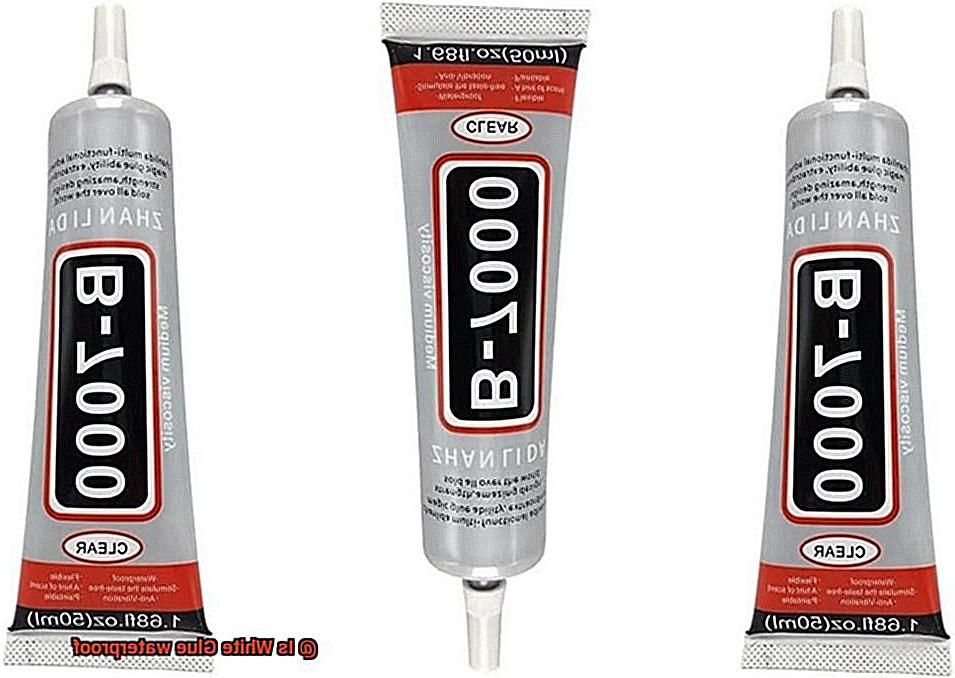
Cyanoacrylate (super glue) is a fast-drying adhesive that can be used on a variety of surfaces. While it may not be the best choice for waterproof projects, it’s great for quick fixes or small projects that require a fast-drying adhesive.
Tips for Applying Water-Resistant White Glue
Water-resistant white glue is the solution to your problem. However, applying this type of glue requires some know-how. Here are five tips to help you achieve a successful bond.
Choose the Right Glue:
Not all water-resistant white glues are created equal. It is essential to choose the right type of glue for your project. Some brands and formulations may be better suited for specific materials or applications than others. Do your research and read the label before making a purchase.
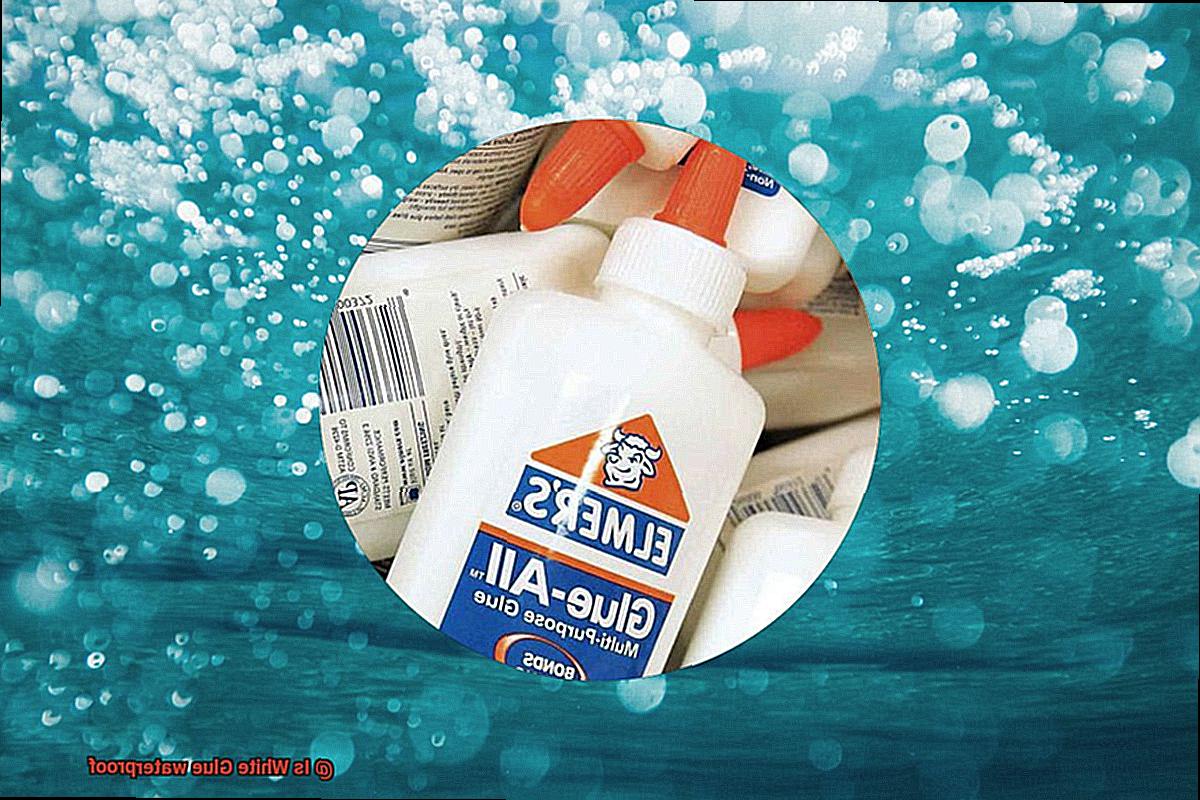
Prepare the Surface:
Before applying the glue, it is crucial to prepare the surface properly. Ensure that it is clean, dry, and free of any debris or dust. Any dirt or moisture on the surface can compromise the strength of the bond. You may also want to rough up the surface slightly with sandpaper to create more texture for the glue to adhere to.
Apply Thinly and Evenly:
When applying the glue, use a small amount and spread it evenly over the surface with a brush or applicator. Applying too much glue can lead to a weaker bond and longer drying times. Additionally, it can cause the glue to seep out from between the surfaces being glued together, creating a messy finish.
Allow Ample Drying Time:
Once applied, give the glue enough time to dry completely before handling or using the glued object. The drying time can vary depending on the brand and type of glue used and the humidity of your environment. Rushing this step can weaken the bond and compromise the overall quality of your project.
Avoid Excessive Moisture:
While water-resistant white glue can resist some water exposure, prolonged or excessive exposure could still weaken the bond over time. It is essential to avoid exposing your project to excessive moisture or water.
qp6jXbne_Fo” >
Also Read: Is Elmer’s Glue Waterproof?
Conclusion
In conclusion, white glue is a beloved adhesive for DIY enthusiasts and crafters due to its versatility and ease of use. However, it’s important to note that when it comes to water resistance, white glue falls short. Its composition of synthetic polymers like polyvinyl alcohol and vinyl acetate monomer make it susceptible to breaking down when exposed to water.
While some manufacturers have created water-resistant or waterproof versions of white glue with additional additives, these options still have their limitations. Temperature and humidity can also impact the durability of white glue.
To choose the right type of glue for your project, consider the materials you’ll be bonding together and determine the strength of bond needed. If waterproofing is necessary, look for specific options or consider using cyanoacrylate (super glue) for fast-drying projects.
When applying water-resistant white glue, proper preparation and application are key. Apply thinly and evenly on a well-prepared surface and allow ample drying time before handling or exposing your project to excessive moisture.
By understanding the properties of adhesives like white glue and following these tips, you can achieve success in your projects with confidence.

